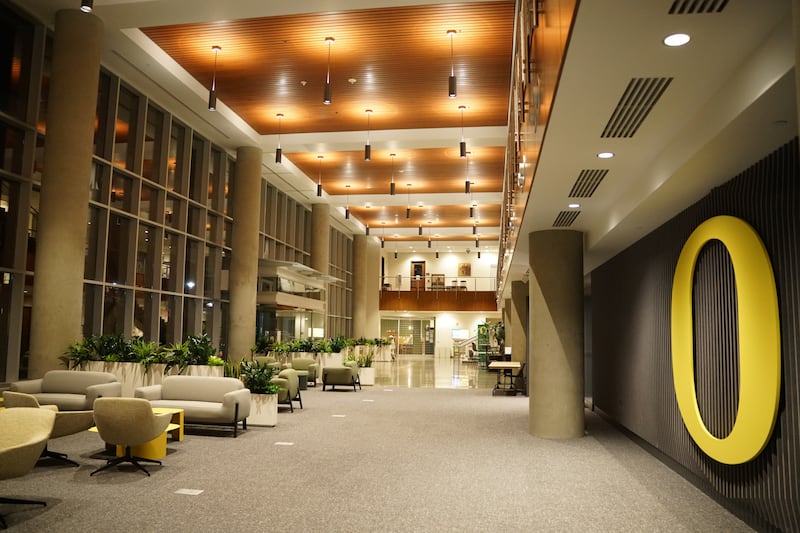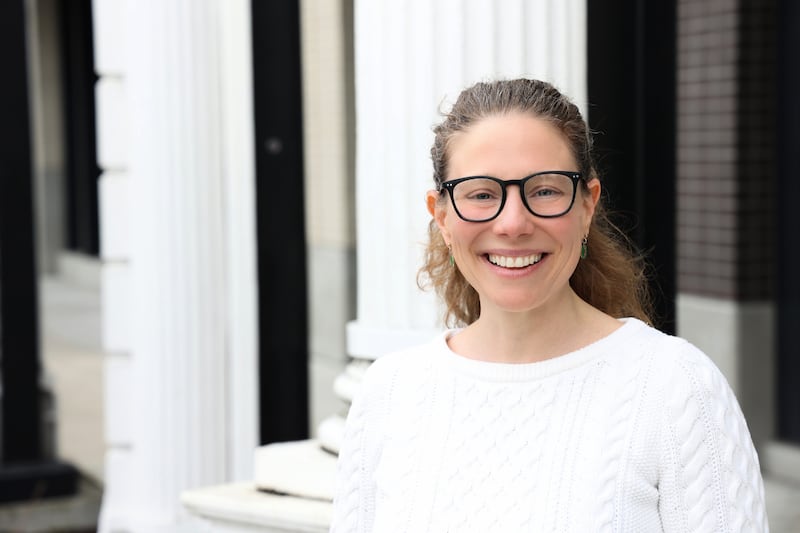This story is published in cooperation with Willamette Week and University of Oregon’s Executive MBA, Portland.
Abbie Trimble didn’t have it all figured out when she enrolled in the Oregon Executive MBA program at the University of Oregon’s Portland campus. But there’s one thing she knew for certain she wanted to achieve.
“I wanted to make sure that, as I progressed in my career, I wanted to be undeniable,” said Trimble, who before graduating from the MBA program in 2024 worked for a company called Modernize to help home services businesses scale up via increased marketing spend. “I wanted to have undeniable credentials, to be tactically excellent at what I do.”
At the end of the 20-month program, which is designed for experienced mid-to-senior managers, business leaders, entrepreneurs and other professionals looking to grow their careers while continuing to work full time, Trimble felt like she had accomplished that – and then some.
Along the way, she also used the second-year capstone portion of the program to explore what it would take to run an innovative HVAC company. And she made amazing connections with her fellow students and instructors, all of which led her to co-found a new company, TradeRise, which helps home service companies maximize the value of every lead and fix the sales process gaps that cost them revenue.
Capstone projects vary based on the interests and needs of the students. The projects allow them to take everything they are learning and develop real-world strategic business plans for their chosen topics. Some students work on projects for their current companies; others work on helping non-profits or other businesses; and some focus on startups. Each student has a capstone advisor, an experienced professional with high-level career experience either in business or academia.
“The MBA program gives you this roadmap that you can apply to make it really easy to create a business,” Trimble said. “Literally because I was in the MBA program, it made it so easy.”
 Opens in new window
Opens in new windowWW: In addition to wanting to move your career forward, why did you choose University of Oregon’s Portland program?
Abbie Trimble: I did research on the University of Oregon compared to every other major program in the United States, and its curriculum and everything competed really well against the top schools. The other school I was strongly considering was MIT. To have a program like that right here in our own backyard – it’s tremendous.
How does a busy professional – and a mother of two kids – find time for an MBA?
A lot of MBA programs, you have to quit your job to go to a program full-time. Whereas an executive MBA at UO works well for whatever stage you’re at in your career. I had a full-time job, and I had no intention of quitting.
The program is every other weekend during the school year, with the summer off. During the in-between times, you’re doing homework, you’re doing the reading, you’re meeting with your teams. It is a big time commitment, but the biggest accomplishments I’ve ever achieved have happened one step at a time like that.
What were some highlights from the first year of the program?
One of the things I found so valuable was the people that I was going to school with. What you end up doing is collaborating with these really smart people. I’m talking like vice presidents and directors and CEOs of companies in all different industries. There’s people from Nike and Intel, startups and industries like metal recycling and apparel design. I had never had a strategic conversation with somebody who is a VP at OHSU or Nike on how they might handle a certain challenge. You’re literally all on the same level, working through a problem collaboratively, and so you get to hear these phenomenal different perspectives that add so much value.
 Opens in new window
Opens in new windowAnd the second year you focused on your capstone project?
I wanted to keep my project simple. I wanted it to be a study of what it is to run and operate an HVAC company. The spin on it was extreme customer service and extreme adoption of technology. I also wanted it to be marketed to women. One of the things that came out of the research I did, is that women are primary decision makers for home services.
A lot of times it’s the women who are making the calls on what’s going on with the house, women who are meeting up with the contractor, and they have different needs. I believe that a company that focuses more on understanding this customer will be more successful, so that was the framing of my capstone.
After completing your capstone, you didn’t actually start the HVAC company but went in a bit of a different direction to found TradeRise.
I was naturally having conversations with people who I’d been working with about what I’d been working on. Through these conversations I began to see a real opportunity to solve the bigger, systemic challenges that so many contractors face around sales process and lead conversion. It became clear that the real opportunity wasn’t in starting one home service company, but in helping many of them scale smarter.
Any advice for someone considering the UO’s Executive MBA program?
It really is doable for just about everyone. You can get an MBA, level up your career and literally change your life. You will have expanded your horizons far beyond what you could ever imagine.
To learn more about University of Oregon’s Portland-based Executive MBA program visit business.uoregon.edu/executive-mba/difference .
